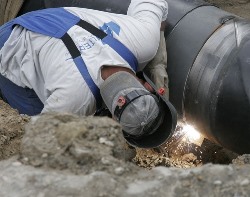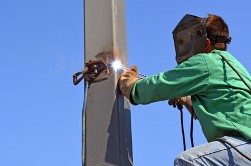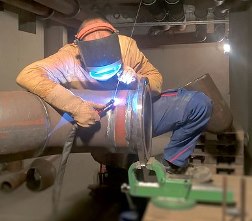How to Pick a Welding Trade School near Valley Nebraska
 Enrolling in the right welder school near Valley NE is an important first step to starting your new career as a professional welder. But since there are numerous schools to choose from, how do you know which ones to consider? And more significantly, once you have narrowed down your alternatives, how do you pick the right one? Most prospective students start by reviewing the schools that are closest to their residences. When they have located those that are within driving distance, they are drawn toward the least costly one. Yes, location and the cost of tuition are important issues when evaluating welding trade schools, but they are not the only ones. Other factors include such things as reputation, accreditation and job placement rates. So before initiating your search for a vocational school to become a welder, it’s prudent to establish a list of qualifications that your selected school must have. But before we explore our due diligence checklist, let’s cover a little bit about how to become a welder.
Enrolling in the right welder school near Valley NE is an important first step to starting your new career as a professional welder. But since there are numerous schools to choose from, how do you know which ones to consider? And more significantly, once you have narrowed down your alternatives, how do you pick the right one? Most prospective students start by reviewing the schools that are closest to their residences. When they have located those that are within driving distance, they are drawn toward the least costly one. Yes, location and the cost of tuition are important issues when evaluating welding trade schools, but they are not the only ones. Other factors include such things as reputation, accreditation and job placement rates. So before initiating your search for a vocational school to become a welder, it’s prudent to establish a list of qualifications that your selected school must have. But before we explore our due diligence checklist, let’s cover a little bit about how to become a welder.
Welding Degree and Certificate Training
 There are several alternatives available to get training as a welder in a technical or trade school. You can receive a diploma, a certificate or an Associate Degree. Bachelor Degrees are offered in Welding Technology or Welding Engineering, but are more advanced courses than most journeyman welders will need. Some programs are also offered combined with an apprenticeship program. Below are short summaries of the most prevalent welding programs available in the Valley NE.
There are several alternatives available to get training as a welder in a technical or trade school. You can receive a diploma, a certificate or an Associate Degree. Bachelor Degrees are offered in Welding Technology or Welding Engineering, but are more advanced courses than most journeyman welders will need. Some programs are also offered combined with an apprenticeship program. Below are short summaries of the most prevalent welding programs available in the Valley NE.
- Certificate and Diploma Programs are normally made available by trade and technical schools and require about a year to complete. They are more hands-on training in nature, designed primarily to develop welding skills. They can furnish a good foundation for a new journeyman or apprentice welder, or specialized skills for experienced welders.
- Associate Degree Programs will take two years to complete and are most often offered by community colleges. An Associate Degree in Welding Technology offers a more well-rounded education than the certificate or diploma while still providing the foundation that readies students to enter the workforce.
Some municipalities and states do have licensing requirements for welders, so make sure to check for your location of potential employment. If needed, the welding school you pick should ready you for any licensing exams that you will have to take in addition to providing the suitable training to become a qualified welder.
Welding Certification Choices
 There are several institutions that provide welding certifications, which test the knowledge and skill level of those applying. A large number of Valley NE employers not only demand a degree or certificate from an accredited welding program, but also certification from a highly regarded organization like the American Welding Society (AWS). Different certifications are available based on the type of work that the welder does. Just some of the skills that certification can acknowledge are the welder’s ability to
There are several institutions that provide welding certifications, which test the knowledge and skill level of those applying. A large number of Valley NE employers not only demand a degree or certificate from an accredited welding program, but also certification from a highly regarded organization like the American Welding Society (AWS). Different certifications are available based on the type of work that the welder does. Just some of the skills that certification can acknowledge are the welder’s ability to
- Work in compliance with specific codes
- Work with specific metal thicknesses
- Work with certain types of welds
- Perform in compliance with contract specifications
As earlier stated, many states, cities or local municipalities have licensing requirements for welders. Of those mandating licensing, many additionally require certification for various kinds of work. Certification is also a means to demonstrate to employers that you are an extremely skilled and qualified welder. So similarly as with licensing, look into the requirements for your location and confirm that the welding vocational school you select prepares you for certification as needed.
How to Decide on a Welder Technical Program
 After you have decided on the credential you would like to attain, a diploma, certificate or degree, you can begin to evaluate schools. As you probably know, there are a large number of welder trade and vocational schools in the Valley NE area. That’s why it’s essential to determine up front what qualifications your school of choice must have. We have already covered a couple of important ones that most people look at first, which are location and the cost of tuition. As mentioned, although they are essential qualifications, they are not the only ones that need to be considered. After all, the program you pick is going to provide the education that will be the foundation of your new profession as a welder. So following are more factors you might want to evaluate before picking a welding vocational school.
After you have decided on the credential you would like to attain, a diploma, certificate or degree, you can begin to evaluate schools. As you probably know, there are a large number of welder trade and vocational schools in the Valley NE area. That’s why it’s essential to determine up front what qualifications your school of choice must have. We have already covered a couple of important ones that most people look at first, which are location and the cost of tuition. As mentioned, although they are essential qualifications, they are not the only ones that need to be considered. After all, the program you pick is going to provide the education that will be the foundation of your new profession as a welder. So following are more factors you might want to evaluate before picking a welding vocational school.
Accreditation. It’s very important that the welding vocational school you decide on is accredited by either a regional or a national organization. There are two standard types of accreditation. The school may earn Institutional Accreditation based on all of their programs. Programmatic Accreditation is based on a specific program the school offers, for instance Welding Technology. So confirm that the program you choose is accredited, not just the school itself. Also, the accreditation should be by a U.S. Department of Education recognized accrediting organization, like the Accrediting Commission of Career Schools and Colleges of Technology (ACCSCT). Besides helping ensure that you get a superior education, the accreditation might also assist in securing financial aid or student loans, which are often not offered in Valley NE for schools that are not accredited. Finally, for those states or municipalities that mandate licensing, they may require that the welding training program be accredited as well.
Job Placement and Apprenticeship Programs. Many welding degree or certificate programs are provided combined with an apprenticeship program. Various other schools will assist in placing you in a job or an apprenticeship after graduation. Ask if the schools you are looking at help in placing students in apprenticeships or have a job placement program. These schools should have partnerships with local unions and various metal working businesses to which they can place their students. Older schools may have a more substantial network of graduates that they can utilize for placements. These programs can assist students in finding employment and develop associations within the Valley NE welding community.
Job Placement and Completion Rates. The completion rate is the percentage of students that begin an academic program and complete it. It’s essential that the welding program you pick has a higher completion rate. A low rate may indicate that the students who joined the program were unhappy with the training, the teachers, or the facilities, and dropped out. The job placement rate is also a good indicator of the caliber of training. A high job placement rate will not only confirm that the program has a good reputation within the field, but also that it has the network of Valley NE employer relationships to help students obtain apprenticeships or employment upon graduation.
Up-to-date Equipment and Facilities. After you have decreased your selection of welding schools to 2 or 3 possibilities, you should consider visiting the campuses to evaluate their facilities. Make sure that both the equipment and the facilities that you will be trained on are up-to-date. Specifically, the training equipment should be comparable to what you will be working with on the job. If you are unsure what to look for, and are already in an apprenticeship program, consult with the master welder you are working under for guidance. Otherwise, ask a local Valley NE welding contractor if they can give you a few tips.
School Location. Even though we already briefly covered the significance of location, there are a couple of additional points that we should cover. You should bear in mind that unless you have the ability to relocate, the welding school you select must be within driving distance of your Valley NE home. If you do choose to enroll in an out-of-state school, in addition to moving costs there might be higher tuition fees for out-of-state residents. This is especially true for welder diploma programs offered by community colleges. Additionally, if the school provides an apprenticeship or job placement program, most likely their placements are within the school’s local community. So the location of the school should be in an area or state where you ultimately will desire to work.
Small Classes. One-on-one training is important for a hands-on trade such as welding. It’s easy to get overlooked in bigger classes and not get much individualized training. Ask what the typical class size is for the welding programs you are looking at. Ask if you can sit in on a couple of classes so that you can experience how much individual attention the students are getting. While there, talk with some of the students and get their feedback. Also, speak with a few of the instructors and ask what their welding experience has been and what certifications and credentials they hold.
Convenient Class Scheduling. Many people learn a new trade while still employed at their current job. Confirm that the class schedules for the programs you are considering are flexible enough to fulfill your needs. If you can only go to classes at night or on weekends near Valley NE, make certain that the schools you are assessing provide those choices. If you can only attend part-time, verify that the school you select offers part-time enrollment. Also, find out what the policy is to make up classes if you you miss any due to illness, work or family responsibilities.
Will You Be Attending Welding School Near Valley NE?
Perhaps you live in the Valley Nebraska area, or have decided to enroll in a Welding Program that has a campus near there. In either case, you may find this bit of history both interesting and informative.
Valley, Nebraska
As of the census[2] of 2010, there were 1,875 people, 804 households, and 489 families residing in the city. The population density was 526.7 inhabitants per square mile (203.4/km2). There were 871 housing units at an average density of 244.7 per square mile (94.5/km2). The racial makeup of the city was 95.3% White, 1.3% African American, 0.4% Native American, 0.5% Asian, 1.1% from other races, and 1.3% from two or more races. Hispanic or Latino of any race were 4.1% of the population.
There were 804 households of which 29.6% had children under the age of 18 living with them, 44.3% were married couples living together, 11.2% had a female householder with no husband present, 5.3% had a male householder with no wife present, and 39.2% were non-families. 34.3% of all households were made up of individuals and 15.8% had someone living alone who was 65 years of age or older. The average household size was 2.26 and the average family size was 2.90.
The median age in the city was 42.3 years. 23.9% of residents were under the age of 18; 7.5% were between the ages of 18 and 24; 22.2% were from 25 to 44; 28.6% were from 45 to 64; and 17.8% were 65 years of age or older. The gender makeup of the city was 47.8% male and 52.2% female.
Online Welding Classes
 Welding is very much a hands-on type of trade, and therefore not extremely compatible with online training. Having said that, there are some online welding classes offered by certain community colleges and vocational schools in the greater Valley NE area that can be credited toward a certificate or degree program. These classes primarily cover such topics as reading blueprints, safety,, and metallurgy. They can help provide a beginner a foundation to start their education and training. Nevertheless, the most important point is that you can’t learn how to weld or handle welding materials unless you actually do it. Clearly that can’t be done online. These skills have to be learned in an on-campus environment or in an apprenticeship. Online or distance learning is better suited for seasoned welders that want to advance their knowledge or possibly earn a more advanced degree. So if you should discover an online welding certificate or degree program, be very cautious and make sure that the majority of the training is done on campus or in a workshop type of environment.
Welding is very much a hands-on type of trade, and therefore not extremely compatible with online training. Having said that, there are some online welding classes offered by certain community colleges and vocational schools in the greater Valley NE area that can be credited toward a certificate or degree program. These classes primarily cover such topics as reading blueprints, safety,, and metallurgy. They can help provide a beginner a foundation to start their education and training. Nevertheless, the most important point is that you can’t learn how to weld or handle welding materials unless you actually do it. Clearly that can’t be done online. These skills have to be learned in an on-campus environment or in an apprenticeship. Online or distance learning is better suited for seasoned welders that want to advance their knowledge or possibly earn a more advanced degree. So if you should discover an online welding certificate or degree program, be very cautious and make sure that the majority of the training is done on campus or in a workshop type of environment.
Pick the Best Welding Trade School Valley NE
Choosing the right welder school will probably be the most critical decision you will make to begin your new career. As we have discussed in this article, there are a number of things that you will need to evaluate and compare between the schools you are considering. It’s a necessity that any welding training that you are evaluating includes a considerable amount of hands-on training. Classes need to be smaller in size and each student should have their personal welding machine to train on. Classroom instruction should provide a real-world frame of reference, and the course of study should be current and conform with industry standards. Courses differ in duration and the kind of credential offered, so you will need to ascertain what length of program and certificate or degree will best serve your needs. Every training program provides unique possibilities for certification also. Probably the best way to research your final list of schools is to go to each campus and speak with the faculty and students. Invest some time to monitor some classes. Inspect the campus and facilities. Make sure that you are confident that the program you decide on is the ideal one for you. With the proper training, effort and commitment, the final result will be a new trade as a professional welder in Valley NE.


